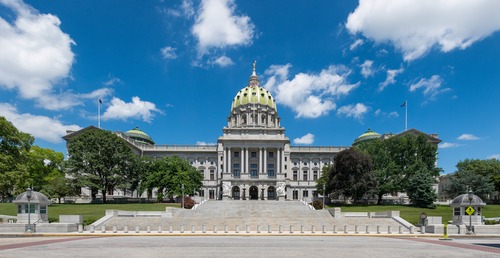
Pennsylvania Gov. Tom Wolf plans to sign into law this week a nearly $40 billion state budget for the 2021-2022 fiscal year after the Republican-controlled Legislature passed a spending plan that does not raise taxes, makes a record deposit in the Rainy Day Fund, and boosts education funding.
The state’s largest business association said that while more needs to be done to improve Pennsylvania’s economic standing, the final budget agreement reached between the governor and Legislature provides welcomed relief to employers. That’s because it will reverse the Department of Labor and Industry’s Final Overtime Rule, a costly regulation that would have changed overtime eligibility standards that Wolf imposed in 2019.
“The damage the Department of Labor and Industry’s Overtime Rule could have caused to Pennsylvania businesses cannot be overstated,” said Pennsylvania Chamber of Business and Industry President and CEO Gene Barr.
Many employers have said they would be unable to afford the higher costs associated with the near doubling of the overtime salary threshold and would be forced to convert salaried employees to hourly workers so hours could be tracked and capped each week, according to the PA Chamber, which opposed the rule.
“Increasing the overtime salary threshold by over 92 percent in around two years would have been a death knell for many businesses already struggling to recover from the pandemic, namely small business owners and nonprofits,” Barr said.
Republican legislative leaders said the on-time budget was fiscally responsible and wisely managed an influx of one-time federal funds that puts the state on a path toward economic recovery amid the pandemic.
The budget for the fiscal year beginning July 1 covers $39.78 billion in state revenues and more than $1 billion in federal pandemic relief funds. The state will set aside an historic $2.5 billion for the state’s Rainy Day Fund, money that can be tapped in the event of a future budget shortfall. It also preserves roughly two-thirds of the federal relief funds to aid future budgets.
The budget approved by the General Assembly does not include any of the tax increases included in the governor’s proposed budget.
“We’ve denied the governor’s tax increases, we’ve made responsible education funding a top priority, we are making crucial deposits in the Rainy Day Fund to handle future challenges, and rebuilding trust in elections by establishing the state’s Bureau of Election audits,” Speaker of the House Bryan Cutler (R-Lancaster) said. “This is a budget Pennsylvanians can be proud of knowing their hard-earned dollars are moving the state out of a pandemic and into a brighter future.”
Senate Democrats said the budget represented bicameral and bipartisan compromise.
“This isn’t the budget I would have designed and in many ways, I feel that it does not take full advantage of the unprecedented resources we have from a budget surplus and the federal American Rescue Plan – but this is a process of compromise, and there is a lot here that I support,” said State Senate Democratic Leader Jay Costa (D-Allegheny). “We are seeing major levels of new and equitable funding in education, and that’s been something my caucus and I have fought for over many years. Further, we are still in recovery from a pandemic that ravaged our state for more than a year and it was important to me that we fund critical state programs with an on-time budget.”
Republican senators said the budget would provide flexibility for the state as the economy starts to grow again.
Sen. President Pro Tempore Jake Corman (R-Bellefonte) said, “The past year and a half was extremely difficult for many Pennsylvania families and employers. In light of these difficult circumstances, I am thankful that we were able to pass a fiscally responsible budget that helps us tackle the immediate needs created by the pandemic as well as the financial challenges that lie ahead.”
The budget will also include $279 million in federal relief funds for transportation infrastructure like road and bridge projects to make up for losses in the Motor License Fund due to the pandemic. In addition, federal relief funds totaling $44 million will be directed to career and technical schools to ensure students can learn the skills needed for today’s jobs.
Gov. Wolf praised the budget for providing the largest education funding increase in state history so students can get the education and training they need to get good jobs in Pennsylvania.